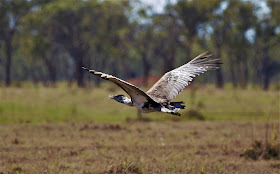 |
| Asian Dowitcher |
Asian Dowitcher, Grey Plover, good numbers of the endangered Far Eastern Curlew, Australian Bustard, Brown Songlark, Red-backed Buttonquail, Fairy Gerygone and Black-necked Stork were among some nice birds encountered over a couple of days in the Maryborough area.
 |
| Asian Dowitcher |
I visited the shorebird high tide roosts at Boonooroo and Maaroom before and after an unusually high tide of 3.1m. I visited both roosts
last February and found them quite productive. I found 2 Asian Dowitchers at Boonooroo among a large flock of Bar-tailed Godwits at the end of Davies Road; this stretch can be quite good 1-2 hours before high tide.
 |
| Terek Sandpipers |
I found an unusually large flock of 70 Terek Sandpipers at the end of Oak Street before moving on to the main high tide roost between the ends Levinge Lane and Scrimshaw Place.
 |
| Grey Plovers |
About 20 Grey Plovers were present here; although fewer than last year, this is clearly a good spot to find this species, which is quite scarce in south-east Queensland.
 |
| Lesser Sand-Plovers |
Large numbers of Lesser Sand-Plover were about.
 |
| Far Eastern Curlews |
It was nice to see good numbers of Far Eastern Curlew, with 210 counted. This species is declining rapidly and is now listed as endangered. Full list for Boonooroo
can be found here.
 |
| Great Knots |
I moved on to the shorebird roost at nearby Maaroom. Large numbers of Great Knot were among the many godwits. A flock of 14 Marsh Sandpipers was present. Another 60 Far Eastern Curlew were counted. With the tide so high, it was possible to watch the shorebirds easily from the vehicle. The Maaroom bird list
can be accessed here.
 |
| Great Egrets |
A small number of Great Egrets were nesting among a large colony of Cattle Egrets at Uhr Park in Maryborough.
 |
| Sacred Kingfisher |
Sacred Kingfisher was here also. A visit to the end of Walkers Point Road was productive, with 1 Red-backed Buttonquail flushed from a track and 3 others calling from a sugarcane plantation. I've not noted this species previously in cane. Horsfield's Bushlark was also present.
 |
| Cane Toads |
The area had been heavily irrigated and cane toads were active in broad daylight. A large female in a pool had 6 or 7 males clambering over her.
 |
| Fairy Gerygone |
Fairy Gerygone, alongside Mangrove Gerygone, was here in mangroves and dry scrub fringing the Mary River.
 |
| White-bellied Cuckoo-shrike |
White-bellied Cuckoo-shrike was about.
See here for the Walkers Point birdlist.
 |
| Australian Bustard |
I drove along Dimond Road at Beaver Rock, finding a fine male Australian Bustard on the edge of cane plantation. It flew across the road and landed in a bare paddock.
 |
| Australian Bustard |
This species is extremely rare in South-East Queensland; the closest I had seen it previously to SEQ was near Monto.
 |
| Wedge-tailed Eagle |
Also in this area were Brown Songlark, Black-necked Stork and Wedge-tailed Eagle. The list for this area
is here.
 |
| Nutmeg Mannikin |
A flock of Nutmeg Mannikin was in tall grasses by the Mary River near the Lamington Bridge. This species was once common in South-East Queensland but is now rarely recorded.
















great birding Greg!
ReplyDelete